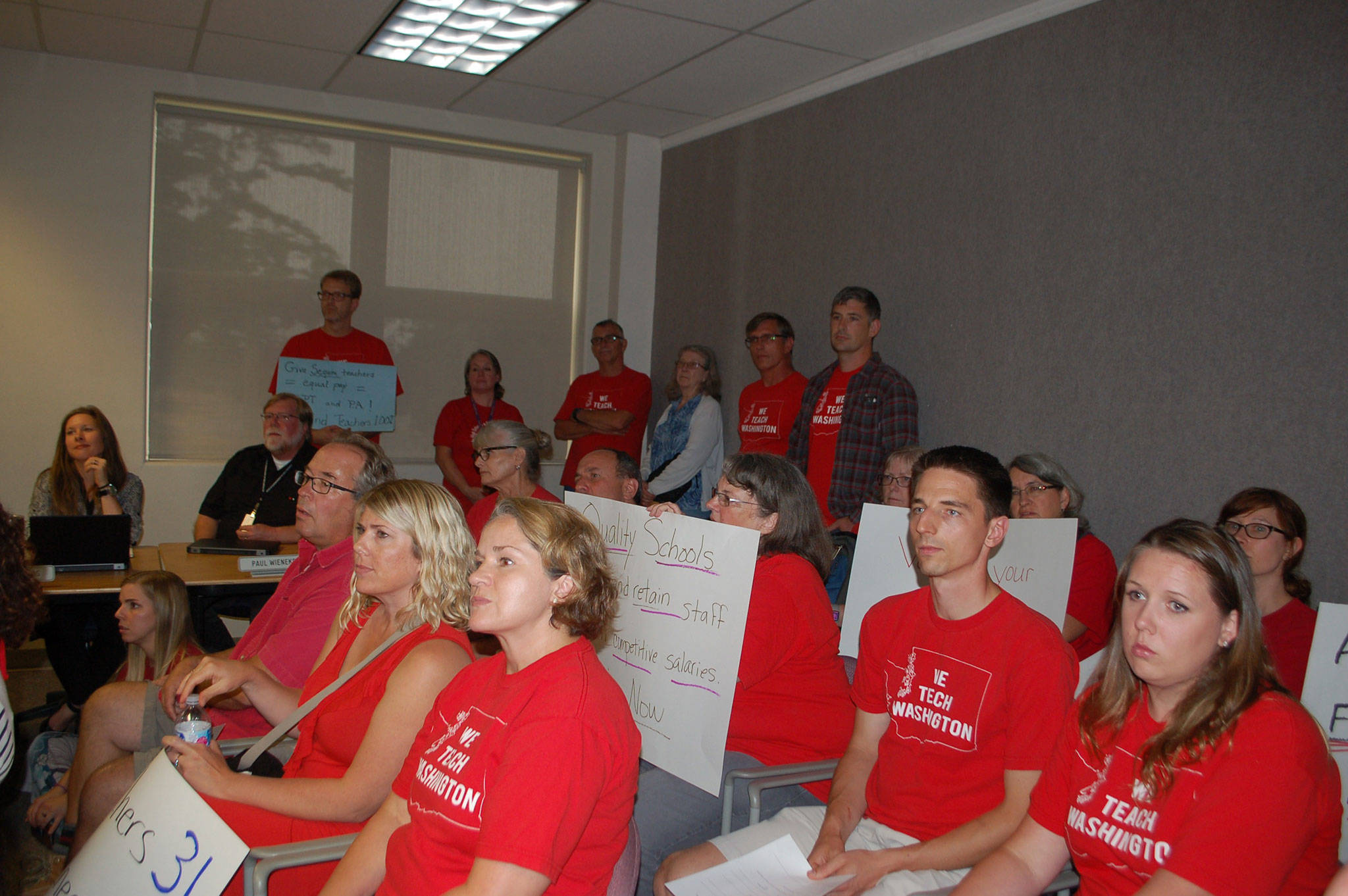Sequim School District and the Sequim teachers’ union reached an agreement last week on a new contract that focuses on more flexible planning time and compensation for teachers.
The Sequim Education Association (SEA) members ratified its new contract with the district on Aug. 29, two days before its previous contract expired on Aug. 31.
The union’s president, Aaron Reno, said members voted on the new contract with about a 98-percent approval rate.
“(Members) are feeling positive with the new contract,” he said.
Reno did not comment on what compensation was established between teachers and the district because the contract has not been ratified by the school board. The contract goes to the school board for approval at its next meeting on Sept. 10. at the district boardroom.
Sequim schools superintendent Gary Neal also would not comment on what compensation was established with teachers because the contract has not been approved by the board, but said the district’s new funding model is set for the next four years.
Collective bargaining started in April, Reno said, and the process was “smooth” this year.
“We put together packets we believe is fair and equitable with surrounding districts,” Reno said.
Reno said one of the main focal points in this year’s negotiations was making changes to planning time for teachers district-wide.
“The biggest change was our planning time was changed to be more flexible,” Reno said.
The new agreement allows teachers more opportunity before school, after school and during the school day to take his or her preparation periods rather than a set time every day, Neal added.
“The collective bargaining agreement prior to this one was worded in a way that locked in on when (teachers) could have prep periods,” Neal said.
McCleary funding
The Supreme Court approved Washington state legislators’ plan to fully fund basic education in public schools per the McCleary mandate in June, one that created a new funding model for teacher salaries in districts across the state.
“Districts had to make their own salary schedule,” Neal said.
“Part of the problem was solving what the funding formula stream looks like for the next four years,” he said. “It really is a four-year plan even though there is a one-year contract (with teacher unions).”
Neal said Sequim teachers will see an increase in regionalization funding that helps with area cost-of-living.
“We got a 6 percent regionalization funding increase for the next four years,” Neal said.
While Sequim teachers feel confident in this year’s contract, Reno said legislators’ McCleary decision funding changes had a significant impact during collective bargaining, and that he believes it’s not a perfect fix.
“There are a lot of complications,” Reno said. “Sequim for example, missed (a) 4 percent funding credit from the state.”
That funding credit is based on the average placement of teachers on the 2017-18 state salary schedule and is only awarded for districts whose average placement is below the state average, Steve McIntire, the school district’s interim business and financial director, said in an email.
He confirmed that Sequim missed out on the funding credit.
“The Sequim District’s average placement is higher than the state average due to the fact of having a veteran staff with a higher than average education level,” he said.
This funding would be available starting the 2019-2020 school year, McIntire said, if the legislature continues to fund it.
“After 2019-2020, this funding may continue or not depending on the state finding a different way to evaluate the experience and education of the certified staff since the old statewide salary schedule has now gone away and is being replaced by a different schedule in each district,” McIntire said.
Reno said members are contacting state legislators to make them aware of the issue.
Portable update
Olympic Peninsula Academy (OPA) plans to hold its Otter Days event on Sept. 6 at the Sequim Boys & Girls Club at 400 W. Fir St. as the district continues to install six portables for the alternative education program to use as the district’s new central kitchen is built and the Sequim Community School is deconstructed.
Neal said the district’s goal was to have the portables ready for OPA by the program’s Otter Days or its first day of school which is set for Sept. 10.
He did not comment on whether or not he thought OPA’s portables would be ready by the first day of school, but said by Sept. 6 the district should have a better idea of a move-in date.
“At this point, we’re going week-by-week,” Neal said.
The portables have Americans with Disabilities Act-compliant ramps and are on permanent foundations, Neal said, but electricity hookups are still being installed as well as fire suppression systems, and that the district is waiting for the city to approve permits once all the building requirements are finished.
“As soon as we get those (permits), we can start getting those folks moved into the portables,” Neal said.
Neal said the Boys & Girls Club is accessible to OPA for the program’s first day of school if the portables are still not ready by its start date.
“We have some back up plans to get us through the first couple of weeks,” Neal said.
The district moved food prep services to Sequim Middle School for food distribution to Sequim’s two elementary schools while the central kitchen is built. Neal said he does not know how long food prep services will operate out of the middle school.
The central kitchen is set to be finished by mid-December, district officials said.
Neal said the northwest corner of the Sequim Community School, where the new kitchen is being built, is almost finished with abatement and deconstruction to follow.



